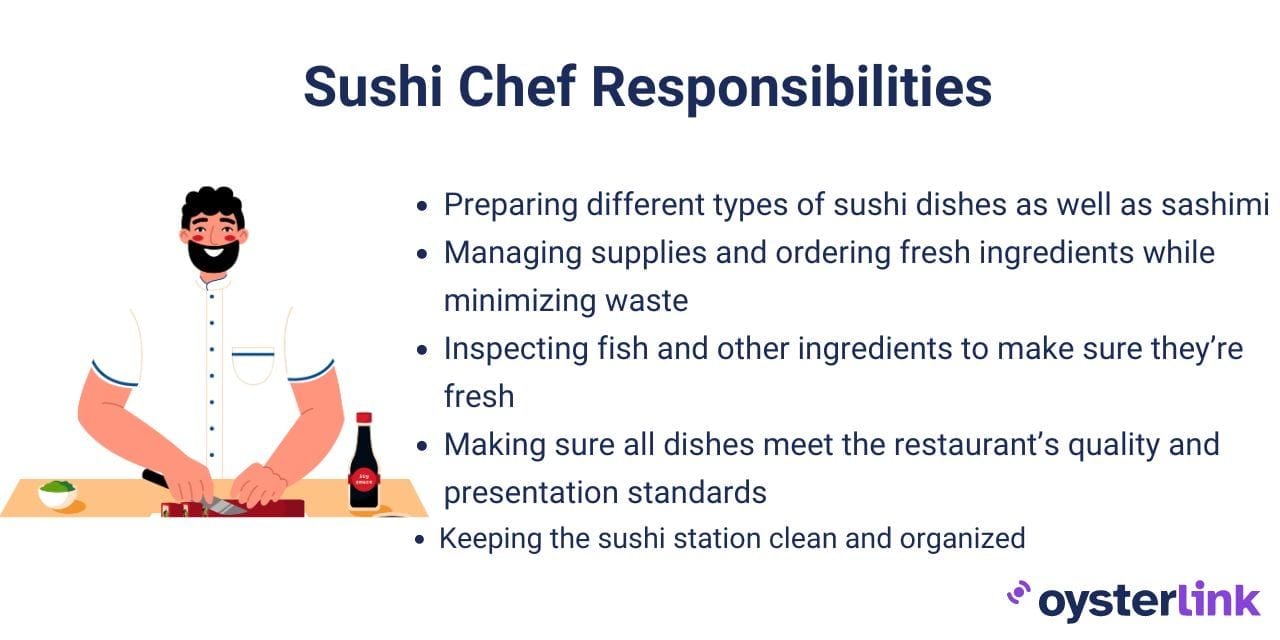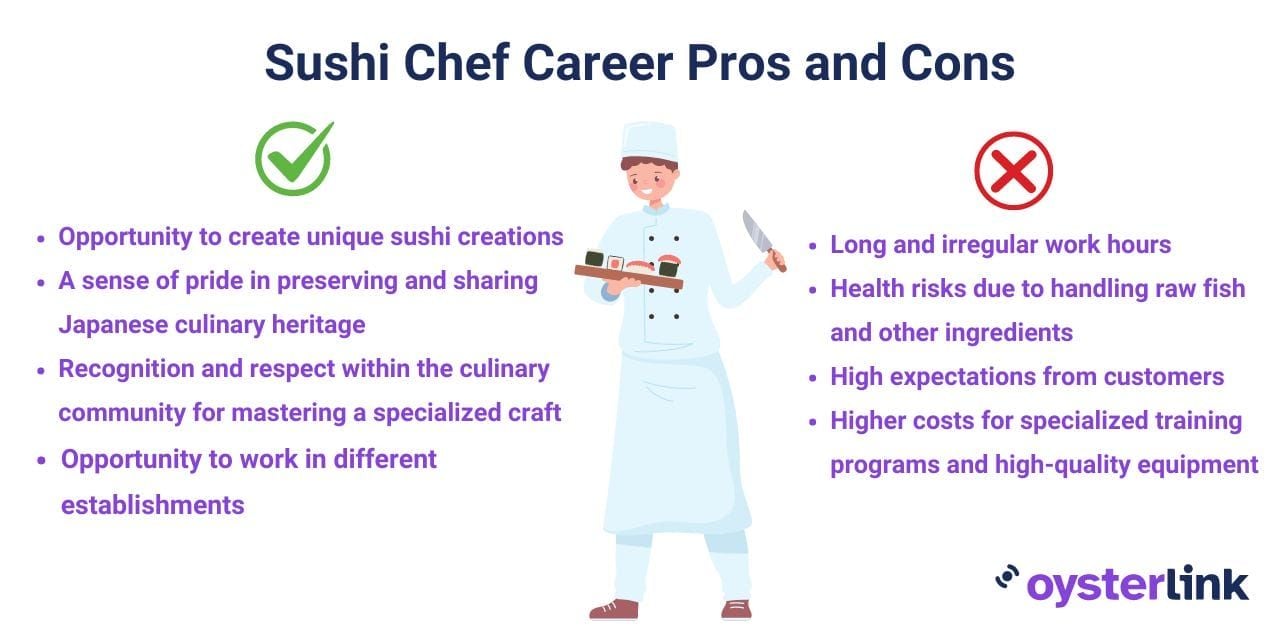Guide to a Sushi Chef Career
If you're in love with Japanese cuisine and are considering starting a career as a Sushi Chef, we have you covered.
This guide will provide you with all the essential information you need to kickstart your journey.
It covers everything from daily responsibilities and the top skills to salary expectations and potential career paths for Sushi Chefs.
What Is a Sushi Chef?
A Sushi Chef is a culinary professional specializing in the preparation of sushi and other Japanese dishes such as sashimi. They transform fresh fish, vegetables and perfectly cooked rice into delicious sushi creations like nigiri, maki rolls, chirashi bowls and temaki.
Sushi Chefs also pay close attention to the visual presentation of sushi dishes. Each piece is arranged with care, making the colors pop and the ingredients look inviting.
What Does a Sushi Chef Do?
The day-to-day responsibilities of a Sushi Chef include:
- Preparing different types of sushi dishes as well as sashimi
- Managing supplies and ordering fresh ingredients while minimizing waste
- Inspecting fish and other ingredients to make sure they're fresh
- Making sure all dishes meet the restaurant's quality and presentation standards
- Occasionally interacting with customers to personalize their dining experience
- Keeping the sushi station clean and organized
- Working with the Restaurant Manager or Head Sushi Chef to develop innovative menu items

Check out our Sushi Chef job description page to learn more about the duties and responsibilities of this role.
Top Skills and Qualities of Successful Sushi Chefs
To excel as a Sushi Chef, you should have the following skills and qualities:
- Excellent knowledge of sushi preparation techniques and Japanese cuisine
- Exceptional knife and fish handling skills
- Ability to pay attention to every detail to ensure each dish you make is perfect
- Innovative approach to creating new sushi dishes and visually stunning presentations
- Ability to recognize low-quality ingredients
- Strong communication skills to effectively interact with staff and customers
- Ability to stay calm under pressure and thrive in a fast-paced kitchen environment
- Leadership skills to mentor junior kitchen staff like Prep Cooks
- Excellent time management skills to efficiently juggle multiple tasks at the same time
- Familiarity with food safety standards and regulations
Education and Experience Requirements for Sushi Chefs
Most employers won't require you to have a culinary degree, course or certificate. A high school diploma will be enough. For this role, having previous experience as a Sushi Chef is often considered more valuable than formal education.
That said, you will probably have a hard time finding a job as a Sushi Chef if you have less than two years of previous experience in this role. This is because sushi preparation demands a high level of skill, precision and familiarity with different techniques.
Still, always make sure to mention any culinary degrees or certifications you possess as they can help you stand out among other candidates.
Here are some educational institutions you should consider if you'd like to enhance your skills as a Sushi Chef as well as give more value to your resume:
Sushi Chef Salary and Earning Potential
The average annual Sushi Chef salary in the United States is $58,909, according to the latest data averaged from Glassdoor, Indeed and Salary.com. This translates into a monthly salary of $4,909.
However, Sushi Chefs may have a higher or lower earning potential depending on their location. For context, New York is the highest-paying state for Sushi Chefs with an average salary of $67,187.
Meanwhile, West Virginia is the lowest-paying state for this role, offering an average salary of $43,516.
Pros and Cons of Being a Sushi Chef
It goes without saying that the Sushi Chef career has its pros and cons — same as any other career. Here are some pros:
- Opportunity to create unique and visually stunning sushi creations
- A sense of pride in preserving and sharing Japanese culinary heritage through authentic dishes
- Recognition and respect within the culinary community for mastering a specialized craft
- Opportunity to work in different establishments — from traditional sushi bars to modern fusion restaurants.

Some cons of working as a Sushi Chef include:
- Long and irregular work hours, often including evenings, weekends and holidays
- Health risks due to handling raw fish and other ingredients, including the potential for foodborne illnesses if strict hygiene and handling practices are not followed.
- High expectations from customers who are knowledgeable and particular about their sushi
- Higher costs for specialized training programs and high-quality equipment
What Does a Typical Workday of a Sushi Chef Look Like?
A Sushi Chef's day starts with prepping ingredients, sharpening knives and cooking rice. The pace picks up during lunch and dinner hours when they combine all the prepped ingredients to create delicious sushi creations.
The rest of the day involves restocking and organizing, cleaning and sanitizing sushi stations.
A Day in the Life of a Sushi Master
Play the video below to see how Chef Nozomu Abe from Sushi Noz in New York City spends a typical day at work.
